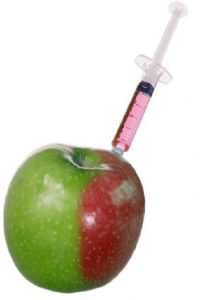Is genetic modification necessary or appropriate?
By Joel MacKenzie, Staff Writer
 Food and Chemical Toxicology showing mice that had developed massive tumours as a result of being fed genetically modified corn. For two years, a varying percentage of the mice’s diets consisted of corn modified to be resistant to glyphosate, a chemical marketed by Monsanto under the name Roundup. While the study’s methodologies and motives have been questioned, it did raise important concerns about the use of genetic modification for the sake of human beings. The Other Press interviewed Douglas College students to gather opinions about this issue.
Food and Chemical Toxicology showing mice that had developed massive tumours as a result of being fed genetically modified corn. For two years, a varying percentage of the mice’s diets consisted of corn modified to be resistant to glyphosate, a chemical marketed by Monsanto under the name Roundup. While the study’s methodologies and motives have been questioned, it did raise important concerns about the use of genetic modification for the sake of human beings. The Other Press interviewed Douglas College students to gather opinions about this issue.
[quote]…genetic modification is a prime example of how humans have asserted their power over animals, and of the lengths we will go to separate ourselves from the earth that we belong to and depend on. [/quote]
Many are against the use of genetically modified food and animals, seeing the process as unnatural. Jenna Miles would “rather [food] not be genetically modified… it could introduce things into your body that probably shouldn’t be in there in the first place.” Kayla Steinman doesn’t “agree with experimentation on animals. At all.” Animals, she argues, “shouldn’t be brought up for experimentation… if the rest of the body gets used, fine, but not just for science.” She sees other animals as being too similar to humans to justify raising them for experimentation: “would you want to be bred for science?” Carly de Moissac and Renée Naidel both agree that it is unnatural. Naidel added that foods like the “prapple” (a cross between a pear and an apple) shouldn’t exist: “if they were meant to be together, they would be together.” Rajvinder Mrock argues that what goes into the genetic modification of plants and animals “in the long run” goes into us, making it unacceptable.
Some were indifferent to the process, or saw it as necessary for the sake of scientific advancement. Toby Zhang admits that when it comes to modifying food or animals for the sake of the earth, “I don’t really care.” In regards to testing genetically modified foods, he responded that “someone has to test that.”
To me, genetic modification is a prime example of how humans have asserted their power over animals, and of the lengths we will go to separate ourselves from the earth that we belong to and depend on. It’s unnatural because it’s changing what has naturally evolved to exist on the earth, and it’s too dangerous to be used on a large scale, as we have no way of testing the long-term effects.
When done to solve environmental problems, or for the sake of efficiency, genetic modification is simply too risky. It could stop diseases and reduce carbon emissions, which would be amazing feats, but before we resort to changing genetics to clean up these problems, we should focus our efforts on ways to reduce their causes, which we are directly related to. Similarly, before resorting to genetic modification for efficiency, we should focus our technology on advancing the way food is produced.
I refuse to believe that genetic modification is the best solution to the efficiency and the environmental problems we are facing in our society. We need increased awareness or consideration of the long-term consequences our actions are having on the earth, lest we reach a point at which we run out of remedies.